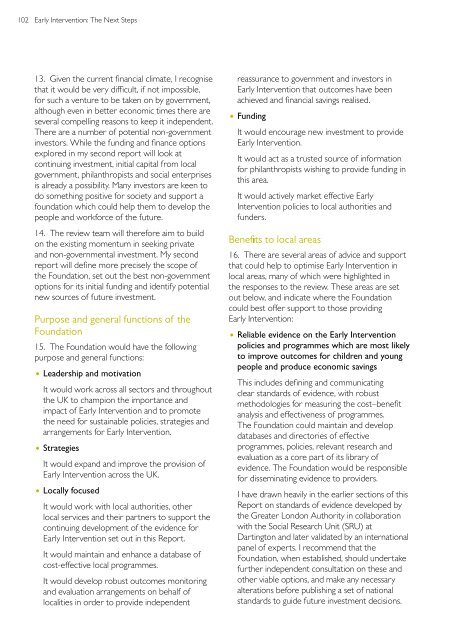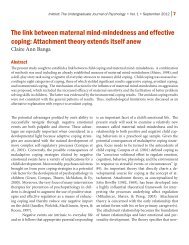early-intervention-next-steps
early-intervention-next-steps
early-intervention-next-steps
Create successful ePaper yourself
Turn your PDF publications into a flip-book with our unique Google optimized e-Paper software.
102 Early Intervention: The Next Steps<br />
13. Given the current fnancial climate, I recognise<br />
that it would be very difcult, if not impossible,<br />
for such a venture to be taken on by government,<br />
although even in better economic times there are<br />
several compelling reasons to keep it independent.<br />
There are a number of potential non-government<br />
investors. While the funding and fnance options<br />
explored in my second report will look at<br />
continuing investment, initial capital from local<br />
government, philanthropists and social enterprises<br />
is already a possibility. Many investors are keen to<br />
do something positive for society and support a<br />
foundation which could help them to develop the<br />
people and workforce of the future.<br />
14. The review team will therefore aim to build<br />
on the existing momentum in seeking private<br />
and non-governmental investment. My second<br />
report will defne more precisely the scope of<br />
the Foundation, set out the best non-government<br />
options for its initial funding and identify potential<br />
new sources of future investment.<br />
Purpose and general functions of the<br />
Foundation<br />
15. The Foundation would have the following<br />
purpose and general functions:<br />
• Leadership and motivation<br />
It would work across all sectors and throughout<br />
the UK to champion the importance and<br />
impact of Early Intervention and to promote<br />
the need for sustainable policies, strategies and<br />
arrangements for Early Intervention.<br />
• Strategies<br />
It would expand and improve the provision of<br />
Early Intervention across the UK.<br />
• Locally focused<br />
It would work with local authorities, other<br />
local services and their partners to support the<br />
continuing development of the evidence for<br />
Early Intervention set out in this Report.<br />
It would maintain and enhance a database of<br />
cost-efective local programmes.<br />
It would develop robust outcomes monitoring<br />
and evaluation arrangements on behalf of<br />
localities in order to provide independent<br />
reassurance to government and investors in<br />
Early Intervention that outcomes have been<br />
achieved and fnancial savings realised. �<br />
• Funding<br />
It would encourage new investment to provide<br />
Early Intervention.<br />
It would act as a trusted source of information<br />
for philanthropists wishing to provide funding in<br />
this area.<br />
It would actively market efective Early<br />
Intervention policies to local authorities and<br />
funders. �<br />
Benefts to local areas<br />
16. There are several areas of advice and support<br />
that could help to optimise Early Intervention in<br />
local areas, many of which were highlighted in<br />
the responses to the review. These areas are set<br />
out below, and indicate where the Foundation<br />
could best ofer support to those providing<br />
Early Intervention:<br />
• Reliable evidence on the Early Intervention<br />
policies and programmes which are most likely<br />
to improve outcomes for children and young<br />
people and produce economic savings<br />
This includes defning and communicating<br />
clear standards of evidence, with robust<br />
methodologies for measuring the cost–beneft<br />
analysis and efectiveness of programmes.<br />
The Foundation could maintain and develop<br />
databases and directories of efective<br />
programmes, policies, relevant research and<br />
evaluation as a core part of its library of<br />
evidence. The Foundation would be responsible<br />
for disseminating evidence to providers.<br />
I have drawn heavily in the earlier sections of this<br />
Report on standards of evidence developed by<br />
the Greater London Authority in collaboration<br />
with the Social Research Unit (SRU) at<br />
Dartington and later validated by an international<br />
panel of experts. I recommend that the<br />
Foundation, when established, should undertake<br />
further independent consultation on these and<br />
other viable options, and make any necessary<br />
alterations before publishing a set of national<br />
standards to guide future investment decisions.



